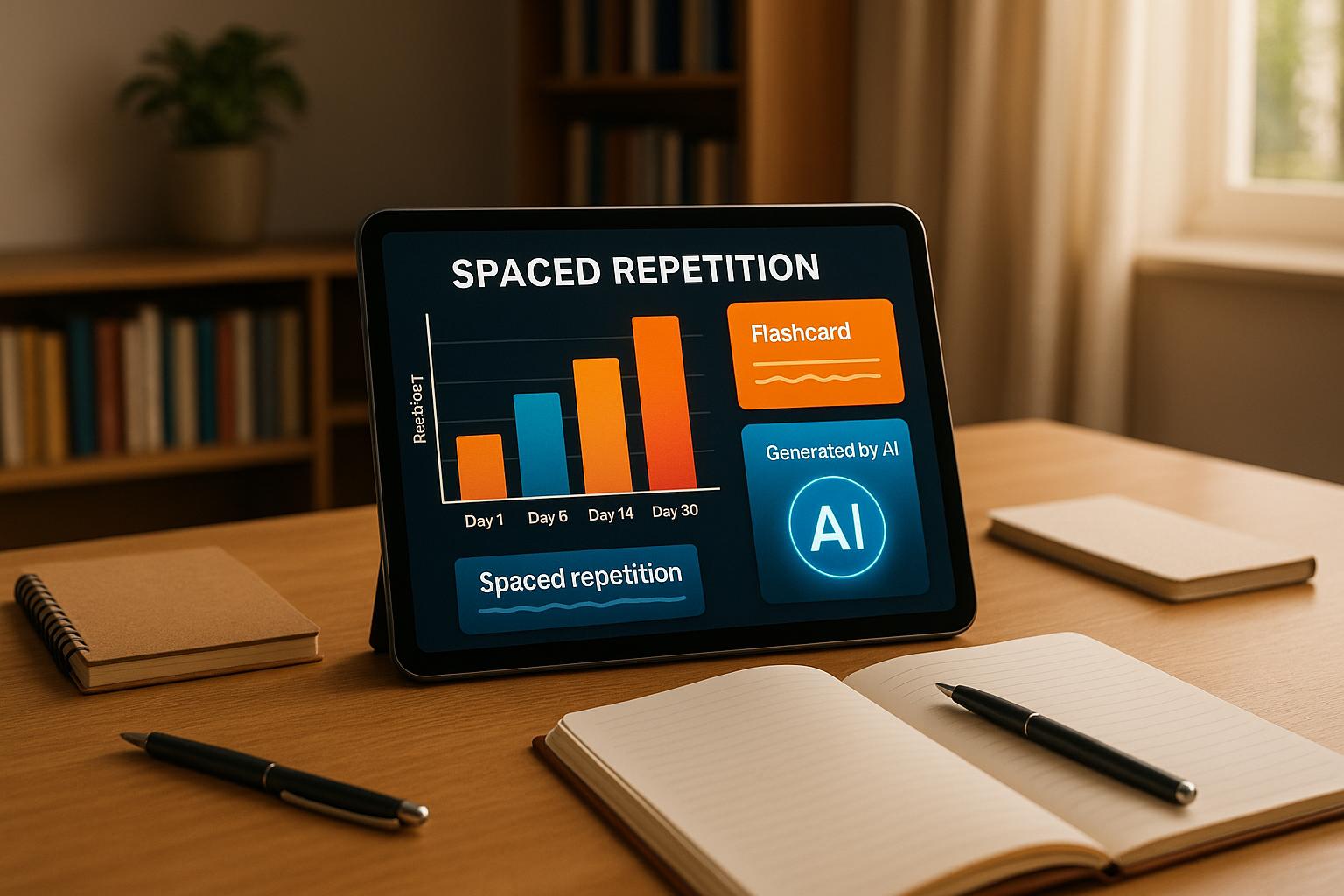Did you know you forget nearly 50% of new information within an hour and 90% within a week? Spaced repetition tackles this by timing reviews to help you remember more for longer. Now, AI makes it even better by personalizing your study schedule, adapting to your progress, and breaking down tough topics into smaller, easier parts. Here’s what AI-powered tools like Testudy.io can do for you:
- Custom Study Plans: AI adjusts review intervals based on your performance, saving you time and boosting retention.
- Quick Quiz Creation: Turn any text into flashcards or quizzes in seconds.
- Adaptive Difficulty: Focus on what you struggle with, while skipping what you’ve mastered.
- Multimedia Support: Learn with videos, images, and audio to match your style.
- Multilingual Options: Study in over 20 languages.
Studies show AI tools improve recall by up to 80%, compared to 60% with traditional methods. Whether you’re a student or a self-learner, AI-powered spaced repetition can help you study smarter, not harder.
Understanding Spaced Repetition and AI
The Science of Spaced Repetition
Spaced repetition works by reinforcing memory at carefully timed intervals, countering the brain’s natural tendency to forget – something known as the forgetting curve. To put this into perspective, a study in the Journal of Medical Education revealed that medical students who used spaced repetition scored an average of 88% on tests, compared to 78% for those who didn’t. Another study published in the Journal of Experimental Psychology showed similar results: participants using spaced repetition retained 80% of the material, while those who crammed retained only 60%. These findings highlight how structured review intervals can dramatically improve memory retention. AI takes this concept further by refining the process.
AI’s Impact on Study Intervals
AI has revolutionized spaced repetition by tailoring review schedules to each learner. Instead of relying on static intervals, AI algorithms adapt based on factors like how well the learner performed, the complexity of the material, and previous recall accuracy. This means harder topics get revisited more often, while content you’ve already mastered shows up less frequently, making your study sessions more efficient and effective.
Main Advantages of AI Study Tools
AI-powered spaced repetition tools bring a host of benefits that traditional methods simply can’t match. Here’s how they stand out:
| Advantage | Description | Impact |
|---|---|---|
| Dynamic Content Creation | Generates varied questions for each review | Encourages deeper understanding, not just rote memorization |
| Intelligent Chunking | Breaks down complex topics into manageable parts | Reduces mental overload and improves retention |
| Multimedia Integration | Incorporates videos, images, and audio | Appeals to different learning preferences |
| Real-time Adaptation | Adjusts difficulty based on your performance | Keeps you engaged without overwhelming you |
Take Testudy.io, for example. This platform creates personalized quizzes and flashcards while analyzing your learning materials. It even suggests ways to break down tough subjects into smaller, easier-to-digest pieces, making it simpler to tackle challenging concepts head-on.
Key Functions of AI Study Tools
Rapid Quiz Generation
AI-powered tools can transform documents into quizzes and flashcards in seconds, making spaced repetition easier and more effective. For example, Testudy.io analyzes text to create targeted quizzes and flashcards, saving users hours of manual work.
Here’s what these tools excel at:
- Pinpointing key ideas and connections in the material
- Crafting a variety of question formats to test comprehension
- Adjusting question difficulty based on the subject
In addition to generating quizzes quickly, these tools adapt review schedules to match your learning speed, ensuring a more efficient study process.
Custom Study Schedules
AI algorithms create personalized study plans by dynamically adjusting review intervals based on individual progress. Studies have shown that this approach boosts learning efficiency. For instance:
- 85% of users reported better grades
- Overall study time was reduced by 30%
- Regular active users achieved a 92% success rate
By tailoring study schedules, AI tools help learners focus on what matters most, all while breaking down language barriers for a global audience.
Multiple Language Options
With support for over 20 languages, tools like Testudy.io make studying accessible to people from diverse linguistic backgrounds. A study by Welocalize in April 2025 highlighted how these tools improve retention by adapting to individual learning speeds.
The impact of multilingual AI tools is evident in user feedback:
"When I heard about the Testudy learning method, I was intrigued. The tool totally delivered – it’s awesome to have an unlimited number of tests at my disposal for any course." – Daniel Scott, Marketing student
Research also shows that just 30 minutes with AI-powered language tools can match the effectiveness of 3 hours of traditional study methods. These tools are reshaping how people learn, offering smarter and faster ways to master new material.
sbb-itb-3165b23
Practical Uses of AI Study Methods
AI study tools have made a noticeable impact on both academic and self-guided learning, showing how technology can reshape education.
College and Professional Studies
AI-powered spaced repetition tools have revolutionized how students approach challenging subjects in higher education. Fields like medicine and law, known for their rigorous demands, benefit greatly from these tools. For instance, platforms like Testudy.io simplify complex material by turning it into easy-to-digest flashcards.
According to research from Omdena, students using AI-enhanced spaced repetition improve their exam preparation efficiency. These systems analyze a learner’s performance and adjust review schedules to target weaker areas, helping boost retention. And it’s not just for college students – self-motivated learners are also seeing the advantages.
Independent Learning
AI tools offer self-directed learners the flexibility to create study plans tailored to their progress. Testudy.io, for example, lets users turn any text into customized quizzes, making independent study more efficient and engaging.
Some standout features include:
- Consistent Review Schedule
AI tools monitor progress and plan review sessions at just the right times, helping learners combat the forgetting curve. - Adaptive Difficulty
These systems adjust the complexity of questions based on performance, keeping learners challenged but not overwhelmed.
Even in the workplace, AI-powered learning tools are making a difference. Companies report a 14% increase in knowledge retention among employees preparing for certifications.
"When I heard about the Testudy learning method, I was intrigued. The tool totally delivered – it’s awesome to have an unlimited number of tests at my disposal for any course." – Daniel Scott, Marketing student
Conclusion
AI-powered spaced repetition is reshaping how we learn by dramatically improving memory retention. Research highlights an impressive 80% recall accuracy with AI tools, compared to just 60% using traditional methods.
What makes this approach even more effective is its ability to adapt. AI systems analyze individual performance in real time, adjusting the difficulty of content to target weak spots. This personalized approach directly combats the "forgetting curve", which shows that nearly 50% of new information can fade within just an hour.
"Practice at retrieval is the ‘single most important variable in promoting long-term retention and transfer.’" – Diane Halpern and Milton Hakel
The practical benefits of this technology are already evident. Platforms like Testudy.io demonstrate how AI can streamline the learning process. These tools can turn any text into quizzes and flashcards, condensing three hours of studying into just 30 minutes. Add to that the ability to create study materials in multiple languages and automate review schedules, and it’s clear how AI is simplifying consistent learning habits.
These advancements don’t just make studying more efficient – they’re paving the way for a new era in education. By integrating AI into learning strategies, students can build stronger knowledge foundations and develop skills that last a lifetime.
FAQs
How does AI make spaced repetition more effective than traditional methods?
AI has reshaped how spaced repetition works by tailoring learning experiences to fit your personal retention patterns. Instead of sticking to rigid review schedules, AI employs advanced algorithms to track your performance and adjust review timing. This ensures you’re revisiting material at the most effective moments to lock it into your long-term memory.
On top of that, AI-powered tools can tweak the difficulty of content on the fly and offer instant feedback. This means you can zero in on areas that need more attention, making the learning process not only more efficient but also customized to suit your individual needs. It’s a smarter, time-saving way to retain knowledge.
How does AI help create personalized study plans for learners?
AI plays a pivotal role in crafting personalized study plans by assessing individual learning needs, including strengths, weaknesses, and pace. Based on this analysis, it adjusts materials and schedules to create a custom approach that promotes better understanding and long-term retention.
Using spaced repetition techniques, AI identifies the best times for learners to review content, making it easier to solidify their memory. This data-driven strategy not only boosts efficiency but also keeps learners engaged, improving overall results.
Can AI-powered spaced repetition tools help with learning outside of school, like in professional training or language learning?
AI-powered spaced repetition tools are incredibly useful beyond traditional academic settings, offering significant benefits in areas like professional training and language learning. These tools adjust to your specific learning needs, concentrating on areas where you struggle while reinforcing material you’ve already mastered. This tailored approach not only saves time but also makes the learning process more engaging.
In professional training, AI can generate flashcards and quizzes designed for specific skills or industries, ensuring you retain essential knowledge. For language learners, AI tools can mimic real-life conversations and provide immediate feedback, allowing you to practice and gain confidence without the stress of a high-pressure setting. By combining AI with spaced repetition techniques, learners can make faster progress and achieve their goals across a wide range of disciplines.




